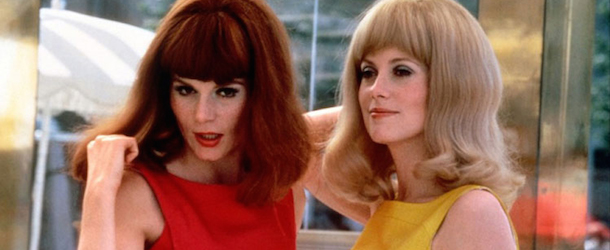by Justin Senkbile
If there's a cinematic equivalent to a springtime as hard-won as this, it would have to be something by Jacques Demy, the French New Wave outlier celebrated in Film Streams' latest “Great Directors” series.
You could stick any number of fluorescent adjectives on to his stories of star-crossed lovers, bleeding hearts and fantastical twists of fate, but these movies are defined at least as much by all the chilly realities breezing just below those surfaces. In the world of Jacques Demy, fate isn't always kind, hearts tend to break, and lovers often find themselves drifting apart.
The series, which runs May 16 through June 12, is made up of seven titles that span his career, from his 1961 debut, Lola, up to 1982's Une chambre de ville, and also includes his widow and fellow director Agnés Varda's documentary The World of Jacques Demy. Last I checked, all but two of them were out of print on home video in the U.S.
Even just a glance at Demy's career would reveal two key names, both essential to his specific air of lightness and longing: Catherine Deneuve and Michel Legrand. Deneuve, still today basically the queen of French cinema, found early success with Demy, and composer Legrand collaborated with him for decades (and scored all but one of the films in this series). And of the pictures they made together, there's little question that the apex of the Demy/Deneuve/Legrand triumvirate came in two spectacular musical bursts made one after the other: 1964's The Umbrellas of Cherbourg and 1967's The Young Girls of Rochefort.
Cherbourg stars translucent Deneuve and the deeply dimpled Nino Castelnuovo as a couple of kids long lost in love in the drizzly provincial town of Cherbourg. A bubbly, sweet first chapter gives way to the more grave — though no less visually vibrant — remainder, wherein their love tries to weather the usual odds: military service, parental enmity and, more than anything, the savage stomp of time.
Important to note right about here that Cherbourg is an opera: every line of dialogue is sung, in French. Which means that every moment becomes a sort of duet between Demy's super-colored images (a dance hall drenched in glossy red, old walls that look like Chagall paintings, an umbrella shop decorated like some kind of crazy wedding-cake-hatbox) and Legrand's score, including his narcotic theme, which seems designed to stick in a person's head for a lifetime.
Such a movie might seem a far cry from what some other young French directors were doing at the time: in '64 François Truffaut had The Soft Skin, and Jean-Luc Godard released Band of Outsiders, both dark, playful crime stories in various shades of cynical. But, then again, the rest of the world at that moment was meeting The Beatles, whose early work isn't too far of a walk from the themes and ideas in Cherbourg.
If Cherbourg is a candy-colored tragedy, then The Young Girls of Rochefort is something like a kaleidoscopic fantasy, altogether louder, giddier and stranger than its predecessor. Likewise for Legrand's score, in which sad strings have ceded ground to a wall of brass and lunatic flutes. The hooks are exponentially brighter, and Legrand's training and prolific recording career as a jazz musician informs every note.
Rochefort is a musical in the classical sense: spoken dialogue punctuated by huge songs and screen-stretching dance numbers. In it, Deneuve and her equally captivating sister Françoise Dorleac play the demoiselles of the title. They're music instructors of some kind who have their own song-and-dance act, and are about to leave for broader horizons in Paris.
Like a Franco-fitted side street on the MGM backlot, Demy's Rochefort bustles with activity. Besides the girls, Michel Piccoli (a walking joke as Monsieur Dame, i.e. Mr. Lady) runs a gleaming white music shop, and Jacques Riberolles creates canvases in his gallery by firing a revolver at little paint filled balloons. The sailors are painters too, and poets, at least the one played by Jacques Perrin. Everyone's fashion choices seem deeply informed by various perennial flowers, and they all have an uncanny sense of color coordination. Plus, Gene Kelly is there, singing and dancing his brains out at 55 years old, in French!
So yes, it’s much more upbeat, but a lot of the foundational details remain the same between the two films. The sad-eyed, solitary side characters for instance, all trapped by distressingly real anxieties or circumstances while the happy-go-lucky kids at the center of the story dance on, oblivious. In a sense, Cherbourg is about growing up and out of such impervious perspectives and ways of living. And the opposite is part of what's so fun about Rochefort: that no one really learns anything, and it all works out because everybody ends up getting exactly what they wanted.
The legacy and influence of Demy in general and of these two movies in particular should be obvious (anyone heard of this guy Wes Anderson?). But all the colors and sounds are just the surface of his singularity – and Legrand's too, by extension, since there's almost no such thing as a Demy film without a Legrand sound. Really, what makes these movies so remarkable boils down to sincerity, emotional openness and a grounded, American-style intelligence. All of which make possible that complex yet accessible feeling.
The miracle of Jacques Demy lies in such apparent contradictions, at the intersection of the world-wearied and the explicitly hopeful.
Justin Senkbile is a writer and filmmaker living in Omaha. Reach him at jmsenkbile@gmail.com.




